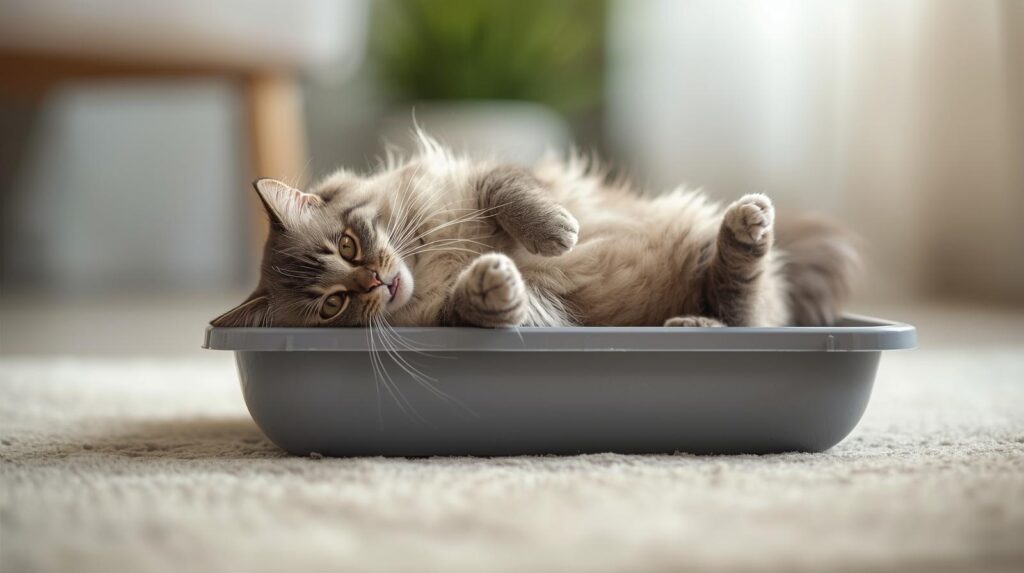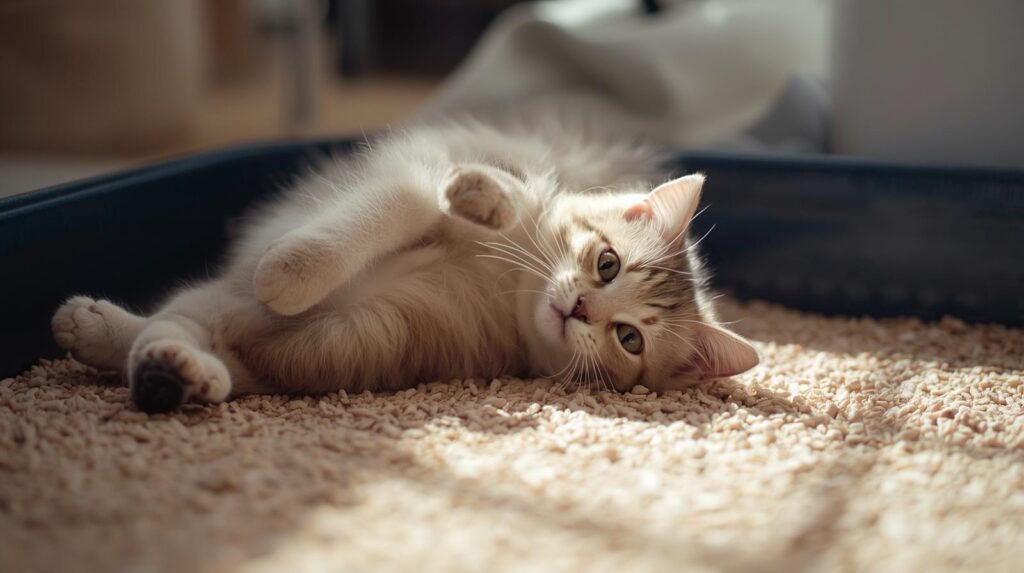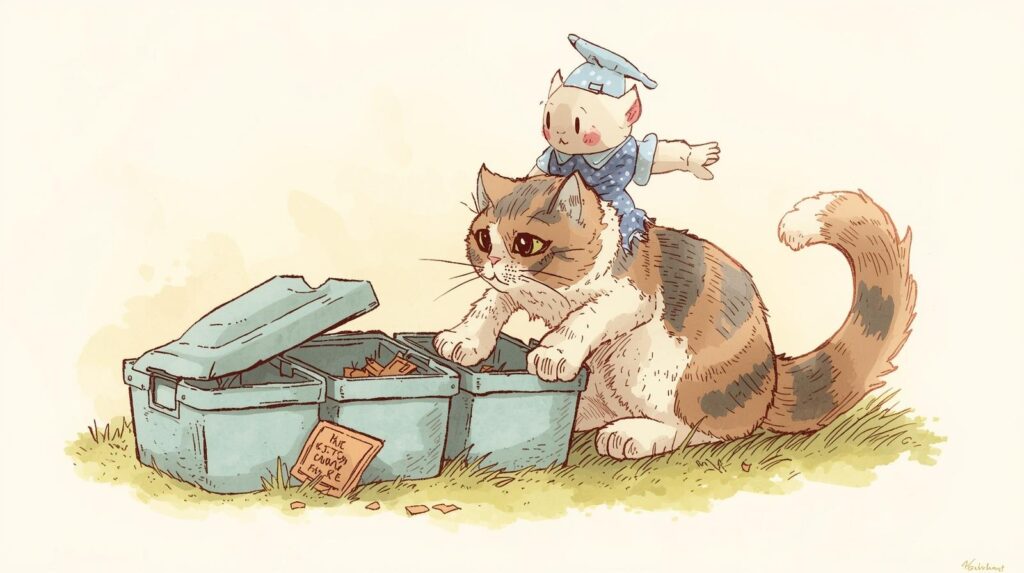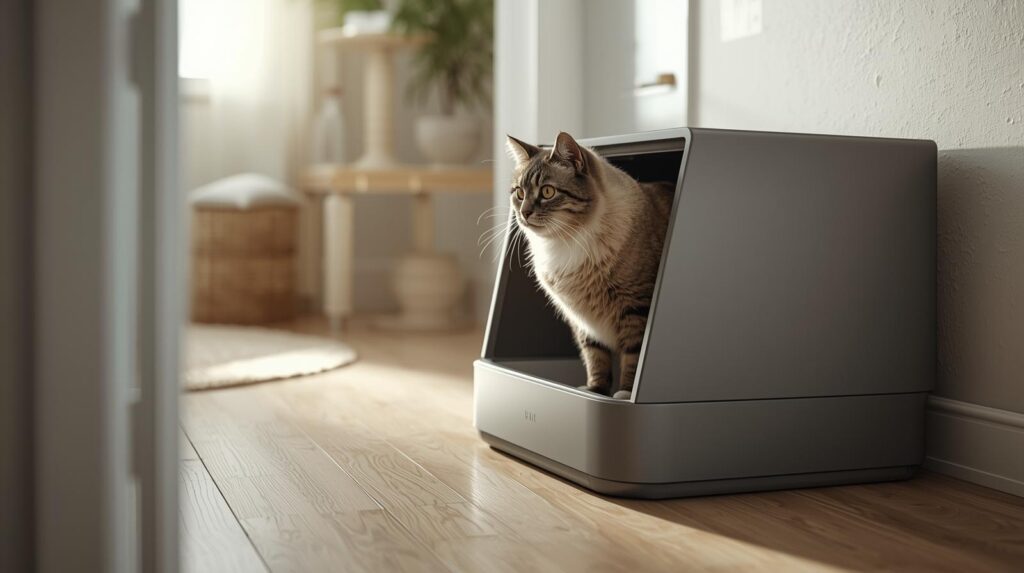
Cats are full of quirky habits that often leave their owners puzzled. One of the most confusing is when a cat suddenly decides to roll around in the litter box. At first glance, this behavior may seem strange—or even concerning—but in most cases, it has an explanation. Some cats do it out of playfulness, others because of instinctive scent-marking, while stress or comfort-seeking can also play a role. Understanding why does your Cat Roll in the Litter Box can help you determine whether it’s harmless fun or a sign of something that needs attention.
Is It Normal for Cats to Roll in the Litter Box?
If you’ve ever caught your cat flopping over and rolling in the litter box, your first reaction might be surprise—or even worry. The good news is that in many cases, this behavior is completely normal. Cats are naturally curious creatures, and some simply enjoy the texture or scent of fresh litter. Kittens, in particular, may treat the litter box like a play area, rolling around as if it were a sandbox.
However, not all rolling is just harmless fun. If your cat spends too much time in the litter box, rolls excessively, or pairs this behavior with other unusual signs (like straining, meowing, or refusing to urinate/defecate), it may indicate a health or stress-related issue. In those cases, what looks like quirky cat rolling behavior could actually be your pet’s way of signaling discomfort or marking territory.
Also read: Maggots in Cat Litter Boxes: Causes, Prevention, and Solutions
Reasons Cats Roll in the Litter Box
The short answer is: cats may roll in their litter box because they’re playful, marking territory, seeking comfort, or experiencing a medical issue. Now let’s break these down in detail so you can better understand your cat’s unique behavior.
a. Playful Behavior (Kittens Especially)
For young cats, the litter box can seem like nothing more than another play area. A kitten rolling in litter box is often just exploring textures and experimenting with movement, much like how children play in sand. While this is usually harmless, it’s a good idea to gently redirect them to toys to avoid creating bad habits.
Also Read: Why Is My Cat Peeing Outside the Litter Box?
b. Scent Marking & Territory
Cats are territorial animals, and one way they establish ownership is through cat scent marking. Rolling in the litter box allows them to spread their scent and claim the area as their own. This is especially common in multi-cat households, where a cat may want to reinforce dominance or feel secure in their environment. This type of territorial cat behavior is instinctive and not usually a cause for concern.
c. Comfort or Stress Relief
Sometimes, rolling in the litter box is less about play or territory and more about emotions. A stressed or anxious cat may seek out the box as a familiar, safe-smelling place. If your cat is showing other cat stress signs—like hiding, over-grooming, or sudden aggression—rolling in the litter might be a coping mechanism. In these cases, addressing the source of stress (new pets, loud noises, changes at home) can help.
d. Medical Issues
In some cases, rolling or lying in the litter box can signal a health concern. Cats with urinary tract infections (UTIs), constipation, or discomfort may linger in the litter box but not use it. Others might roll or shift around if they’re trying to find a comfortable position, especially if cat rolling in litter box after peeing happens repeatedly. If you notice these patterns, it’s best to consult a veterinarian to rule out medical problems.
When to Be Concerned
While the occasional roll in the litter box is usually harmless, there are times when this behavior may be a red flag. So, is rolling in the litter box a sign of illness? Sometimes, yes. The key is to pay attention to context and frequency.

- Spending too much time in the litter box – A healthy cat should only enter the box to urinate or defecate. If your cat is lingering, lying down, or rolling excessively, it may be a sign of discomfort.
- Rolling paired with no elimination – If your cat enters the box but doesn’t actually use it, this could indicate urinary issues, constipation, or blockages.
- Changes in behavior – Sudden rolling when your cat never did this before, or rolling combined with meowing, straining, or frequent bathroom visits, may indicate something is wrong.
- Signs of stress or anxiety – If rolling happens alongside hiding, loss of appetite, or aggression, it may be linked to emotional distress.
In these cases, it’s important to monitor your cat closely and, if needed, schedule a vet check. Catching health issues early—like urinary tract infections (UTIs) or digestive problems—can make a big difference in your cat’s well-being.
How to Stop a Cat From Rolling in the Litter Box
If your cat’s rolling habit is more than a quirky one-time event, you may be wondering how to stop cat from rolling in the litter box. The good news is that with a few adjustments, you can usually redirect this behavior.
- Keep the litter box clean
Cats are fastidious animals. A dirty box can trigger strange behaviors, including rolling. Scooping daily and replacing litter regularly make the box more appealing for its intended purpose. - Provide toys & enrichment
Sometimes, cats roll in the box simply because they’re bored. Make sure your cat has plenty of play options—interactive toys, scratching posts, or puzzle feeders—so the litter box doesn’t become a playground. - Offer multiple litter boxes
In multi-cat households, competition over a single litter box may cause stress or territorial rolling. The rule of thumb is one box per cat, plus one extra. This reduces conflict and keeps each cat comfortable. - Schedule a vet check if needed
If your cat rolls frequently, lies in the box without using it, or shows signs of pain, don’t ignore it. A veterinarian can rule out health issues like urinary tract infections, constipation, or other medical problems.
With patience and a few lifestyle adjustments, most cats can be gently guided away from rolling in their litter box.
Our Recommended Products to Stop Your Cat from Rolling in the Litter Box
If your cat keeps rolling in the litter box, a few smart product choices can make a big difference. Here are some highly recommended options:
1. Covered or Enclosed Litter Boxes
Enclosed designs give your cat privacy and reduce the temptation to roll around.
- Petmate Booda Dome Clean Step Cat Litter Box
- Benefit: Limits space for rolling and controls litter scatter.
2. Top-Entry Litter Boxes
Top-entry boxes discourage rolling while keeping litter inside.
- IRIS USA Top Entry Cat Litter Box
- Benefit: Cats enter from the top, so they can’t flop down inside as easily.
3. Attractive Cat Toys & Enrichment
Redirect playful energy away from the litter box with toys.
- Cat Dancer Wand Toys or Interactive Puzzle Feeders
- Benefit: Keeps kittens busy so they don’t treat the box like a sandbox.
4. Cat Calming Products
If rolling is stress-related, calming diffusers or sprays can help.
- Feliway Classic Diffuser
- Benefit: Reduces anxiety and stress behaviors, including unusual litter box habits.
5. High-Quality Litter
Sometimes cats roll because they like the texture or smell of litter. Switching to a better litter may reduce this.
- Dr. Elsey’s Precious Cat Ultra Clumping Litter
- Benefit: Low dust, better odor control, and less “sandbox” appeal.
FAQs
Why does my kitten roll in the litter box?
Kittens are naturally curious and playful. A kitten rolling in the litter box often treats it like a sandbox. This is usually harmless, but should be gently redirected to toys so it doesn’t turn into a habit
Is rolling in the litter box harmful?
Occasional rolling is not harmful and may just be play or scent-marking. However, if your cat does it excessively, stays in the box too long, or shows signs of discomfort, it could signal stress or illness.
Should I stop my cat from rolling in litter?
If it happens rarely, there’s no need to intervene. But if your cat is rolling in dirty litter, or you notice health-related issues, it’s best to discourage the behavior by keeping the box clean and offering enrichment.
Do cats roll in litter because they like the smell?
Sometimes, yes. Cats may roll in fresh litter because they enjoy the texture or scent. They may also do it to mix their scent with the box as part of territorial behavior.
Why is my cat rolling in a dirty litter box?
Rolling in dirty litter may be linked to stress, marking, or even illness. Cats normally dislike dirty environments, so this could be a sign that something is off. A clean box and a vet check (if the behavior continues) are recommended.


